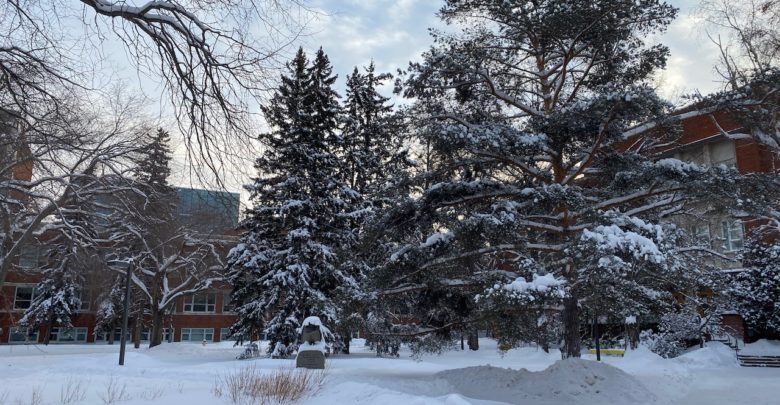New Sexual and Gender-Based Violence Policy approved
The previous Sexual Violence Policy underwent a name change, was rewritten in simpler language, and is survivor-centred.
 Emily Williams
Emily WilliamsTrigger Warning: This article discusses topics related to sexual and gender-based violence that some readers may find upsetting. Resources are available at the end of the article.
According to the University of Alberta’s 2021-22 annual report of student conduct responses, 65 disclosures of sexual violence were made to the Office of the Dean of Students (DoS) from July 1, 2021, to June 30, 2022.
“Disclosures to the DoS have increased by 120 per cent compared to the 2020/21 academic year. It was noted that as more students returned to in-person learning and living in-residence, there were increased numbers of students seeking assistance under the Sexual Violence Policy (SVP) to feel safe on campus,” the report says.
In February 2022, the Minister of Advanced Education, Demetrios Nicolaides, and Associate Minister of Status of Women, Whitney Issek, sent a joint letter to all public post-secondary institutions in Alberta.
The letter stated that all public post-secondary institutions in Alberta had to update their sexual violence policies and procedures, to make sure they are trauma-informed, and procedurally fair.
The Sexual Violence Policy was first approved by the General Faculties Council (GFC) on June 23, 2017. On November 22, 2022, the new Sexual and Gender-Based Violence Policy (SGBVP) was approved by the Board of Governors (BoG), and GFC.
“There are forms of gender-based violence that are not sexual,” Sexual Violence Response Coordinator says
The hiring of Deb Eerkes, the U of A’s Sexual Violence Response Coordinator, and advocacy from the U of A’s Students’ Union (UASU), both contributed to the policy change.
“My role is a result of years of student advocacy,” Eerkes said. “I am responsible for making sure that across the institution, we have a consistent and appropriate response to sexual violence and gender-based violence.”
The previous Sexual Violence Policy underwent multiple changes, one of them being a name change to include the word “gender-based.” According to Eerkes, gender-based violence is an umbrella term that is not limited to sexual violence.
“There are forms of gender-based violence that are not sexual. For example, anti-trans hate, or forms of intimate partner violence — which can be sexual sometimes, or not,” Eerkes said.
“Those are things that actually do affect our campus community, and were not included in the previous policies. So that’s why we did the update.”
The Code of Student Behaviour — now the Student Conduct Policy — was updated to include gender-based violence as well, as it was used to address allegations of sexual violence against students.
The new SGBVP is “survivor-driven.” Eerkes said this means that a survivor has autonomy when they come to the university with a disclosure. A survivor can choose if they want to disclose at all, who they want to disclose to, what process they prefer, and how they want to participate in the process.
“While the survivor can choose what they want to do, the university is still on the hook to do something to make sure the environment is safe,” Eerkes said.
The Options Navigation Network (ONN), set to be activated in early 2023, was created alongside the new policy. For survivors who choose to make a disclosure, ONN will provide staff that are trained in handling sexual and gender-based violence disclosures.
Eerkes emphasized that ONN staff will have enhanced training in the options available, how to talk to survivors about those options, and how to connect them to the option that they are interested in.
The new SGBVP is written in plain language, so that the policy is more accessible, and easier to understand.
“A plain language policy is a trauma-informed measure. When someone’s brain is flooded with chemicals that come as a result of trauma, legalese is not going to help,” Eerkes said.
Before the policy change, a complaint had to be made at the University of Alberta Protective Services (UAPS) in order for next steps to be taken through the university. Now, if an individual wants to make a complaint against a student, the complaint can be made to DoS.
“We have taken serious steps to decriminalize the process so it doesn’t look the same as making a police complaint,” she said.
Under the new policy, a complainant has the same procedural fairness rights as the person under an allegation. A complainant is now able to appeal a decision as well.
Joannie Fogue, UASU vice-president (student life), oversaw the advocacy for the SGBVP and the policy changes.
“I worked very close with Eerkes to make sure that everything that’s going within the policy is reflective of what we’ve been hearing from survivors, and from students,” Fogue said. “I also took the time to meet with different groups on campus [that] are disproportionately affected by SGBV.”
According to Fogue, the new policy is a first step to addressing systematic barriers for marginalized students who are “disproportionately affected by gender-based violence.”
“We still need to see what the response is from the community, from survivors, from those who are going to be taking the training, and if it will actually remove some of those barriers.”
For crisis support during The Sexual Assault Centre’s operating hours, visit 2-705 SUB, phone 780-492-9771, or email [email protected].
The Sexual Assault Centre of Edmonton‘s Support and Information Line is available from 9 a.m. to 9 p.m., seven days a week, 365 days a year.
Alberta’s One Line for sexual violence is a toll-free phone, text, and chat service, private and available throughout Alberta from 9 a.m. to 9 p.m. daily. Call or text 1-866-403-8000.
The Central Alberta Sexual Assault Support Centre provides phone and text support outside of these hours at 1-866-956-1099.




